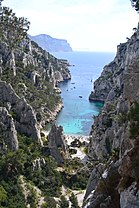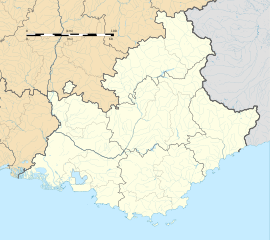
Marseille
Second-largest city in France / From Wikipedia, the free encyclopedia
Dear Wikiwand AI, let's keep it short by simply answering these key questions:
Can you list the top facts and stats about Marseille?
Summarize this article for a 10 years old
Marseille[lower-alpha 1] (formerly spelled in English as Marseilles) is the prefecture of the French department of Bouches-du-Rhône and capital of the Provence-Alpes-Côte d'Azur region. Situated in the Provence region of southern France, it is located on the coast of the Gulf of Lion, part of the Mediterranean Sea, near the mouth of the Rhône river. Its occupants are called Marseillais.
Marseille | |
|---|---|
Prefecture and commune | |
|
From top to bottom, left to right: Old Port and Notre-Dame de la Garde, narrow streets near Fort Saint-Jean, Sormiou in Calanques National Park, view of the Frioul archipelago from the city, Palais Longchamp, Marseille Cathedral | |
| Motto(s): Actibus immensis urbs fulget massiliensis "The city of Marseille shines from its great achievements" | |
| Coordinates: 43°17′47″N 5°22′12″E | |
| Country | France |
| Region | Provence-Alpes-Côte d'Azur |
| Department | Bouches-du-Rhône |
| Arrondissement | Marseille |
| Canton | 12 cantons |
| Intercommunality | Aix-Marseille-Provence Metropolis |
| Subdivisions | 16 arrondissements |
| Government | |
| • Mayor (2020–2026) | Benoît Payan[1] (PS) |
| Area 1 | 240.62 km2 (92.90 sq mi) |
| • Urban (2020[2]) | 1,758.2 km2 (678.8 sq mi) |
| • Metro (2020[3]) | 3,971.8 km2 (1,533.5 sq mi) |
| Population | 870,321 |
| • Rank | 2nd in France |
| • Density | 3,600/km2 (9,400/sq mi) |
| • Urban (Jan. 2020[5]) | 1,618,479 |
| • Urban density | 920/km2 (2,400/sq mi) |
| • Metro (Jan. 2020[6]) | 1,879,601 |
| • Metro density | 470/km2 (1,200/sq mi) |
| Demonym(s) | Marseillais (French) Marselhés (Occitan) Massiliot (ancient) |
| Time zone | UTC+01:00 (CET) |
| • Summer (DST) | UTC+02:00 (CEST) |
| INSEE/Postal code | 13055 /13001-13016 |
| Dialling codes | 0491 or 0496 |
| Website | marseille.fr |
| 1 French Land Register data, which excludes lakes, ponds, glaciers > 1 km2 (0.386 sq mi or 247 acres) and river estuaries. | |
Marseille is the second most populous city in France, with 870,321 inhabitants in 2020 (Jan. census)[7] over a municipal territory of 241 km2 (93 sq mi). Together with its suburbs and exurbs, the Marseille metropolitan area, which extends over 3,972 km2 (1,534 sq mi), had a population of 1,879,601 at the Jan. 2020 census,[6] the third most populated in France after those of Paris and Lyon. The cities of Marseille, Aix-en-Provence, and 90 suburban municipalities have formed since 2016 the Aix-Marseille-Provence Metropolis, an indirectly elected metropolitan authority now in charge of wider metropolitan issues, with a population of 1,903,173 at the Jan. 2020 census.[8]
Founded c. 600 BC by Greek settlers from Phocaea, Marseille is the oldest city in France, as well as one of Europe's oldest continuously inhabited settlements.[9] It was known to the ancient Greeks as Massalia (Greek: Μασσαλία, romanized: Massalía) and to Romans as Massilia.[9][10] The name Massalia probably derives from μᾶζα (mass, lump, barley-cake), the "lump" being the La Garde rock. Marseille has been a trading port since ancient times. In particular, it experienced a considerable commercial boom during the colonial period and especially during the 19th century, becoming a prosperous industrial and trading city. Nowadays the Old Port still lies at the heart of the city, where the manufacture of Marseille soap began some six centuries ago. Overlooking the port is the Basilica of Notre-Dame-de-la-Garde or "Bonne-mère" for the people of Marseille, a Romano-Byzantine church and the symbol of the city. Inherited from this past, the Grand Port Maritime de Marseille (GPMM) and the maritime economy are major poles of regional and national activity and Marseille remains the first French port, the second Mediterranean port and the fifth European port.[11] Since its origins, Marseille's openness to the Mediterranean Sea has made it a cosmopolitan city marked by cultural and economic exchanges with Southern Europe, the Middle East, North Africa and Asia. In Europe, the city has the third largest Jewish community after London and Paris.[12]
In the 1990s, the Euroméditerranée project for economic development and urban renewal was launched. New infrastructure projects and renovations were carried out in the 2000s and 2010s: the tramway, the renovation of the Hôtel-Dieu into a luxury hotel, the expansion of the Velodrome Stadium, the CMA CGM Tower, as well as other quayside museums such as the Museum of Civilisations of Europe and the Mediterranean (MuCEM). As a result, Marseille now has the most museums in France after Paris. The city was named European Capital of Culture in 2013 and European Capital of Sport in 2017. Home of the association football club Olympique de Marseille, one of the most successful and widely supported clubs in France, Marseille has also hosted matches at the 1998 World Cup and Euro 2016. It is also home to several higher education institutions in the region, including the University of Aix-Marseille.




.jpg/139px-France_-_Marseille_(29881013814).jpg)





